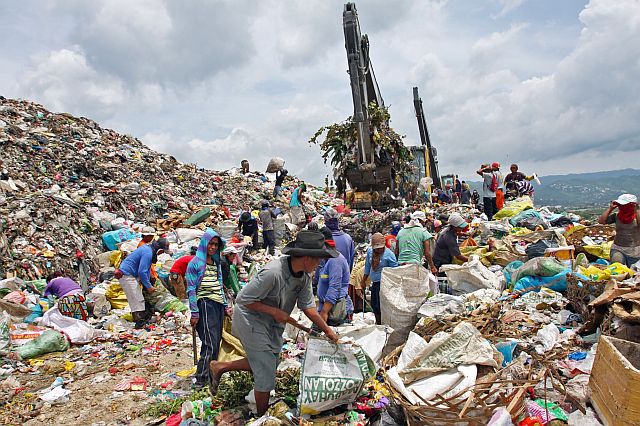
INAYAWAN LANDFILL (CDN FILE PHOTO)
A LOCAL entrepreneur whose restaurant is located at the South Road Properties (SRP) has expressed concern over the reopening of the Inayawan Landfill, saying it has already affected his business there.
Bunny Pages, chairman and CEO of Pages Holdings, Inc. (PHI), said he has been receiving a growing number of complaints from customers of Lantaw SRP since the dumpsite reopened last June 28.
“It has really affected the business and sales are starting to drop,” he told Cebu Daily News, although he did not elaborate.
Pages said restaurant customers have constantly been complaining about the smell coming from the landfill.
He said he is worried the number of complaints from his customers will continue to rise while sales will continue to drop if this issue will not be addressed.
For 24-year-old eatery owner Marie Ritchen Amistad, however, business has been better since the landfill reopened.
Amistad and her father, 63-year-old Herculano, live in a shanty that doubles as an eatery and a sari-sari store just 100 meters away from the entrance of the Inayawan Landfill.
They sell viands such as mixed vegetables, fried fish, and fried meat for P5 to P15.
Since they are near the landfill, most of their customers are dumpsite workers and scavengers.
“When the landfill was closed, we noticed that there were fewer people who came here to eat. But when the landfill was reopened, there were more people again,” she told CDN in Cebuano.
They earn P250 at most each day, with almost all of it used up for their own daily food consumption, she said.
Only Amistad and her father live in the shanty following the death of her mother, Narcisa, some years ago.
Amistad said she doesn’t really mind that they live near a dumpsite because they’re not bothered by the smell.
She also said that despite health risks, nobody has ever complained about getting sick from eating their food.
Smell from landfill
Smell from the landfill usually reaches establishments at the SRP and is especially noticeable when the wind blows northward.
Pages said he hopes the Cebu City government would consider other areas to dump garbage in, where not many residents and businesses will be affected.
Lantaw SRP is the third PHI-owned restaurant under the same brand, with the first and second ones located at Barangay Busay in Cebu City and Cordova town.
The landfill was closed in January last year upon the order of former Cebu City mayor Michael Rama to prevent health and environmental hazards brought about by the site reaching its maximum capacity.
Before the Inayawan dump site was reopened, the city government disposed of its waste in a privately owned sanitary landfill in Consolacion, a town 27 kilometers north of Cebu City.
As part of cost-cutting measures, the landfill was reopened last June by then acting Cebu City mayor Margarita Osmeña who submitted a list of commitments the city government would fulfill to the Environmental Management Bureau, an attached agency of the Department of Environment and Natural Resources.
The city government vowed to adhere to Republic Act No. 9003 or the Ecological Solid Waste Management Act of 2000 on the establishment of a new solid waste management system.
Furthermore, the commitment stated that there was a conceptual plan for the landfill, plans to establish a Materials Recovery Facility, and to create a multipartite monitoring team.
While part of this system is the strict enforcement and monitoring of the “No Segregation, No Collection” policy, locators at SRP are more concerned about the bad smell coming from the site.
Locators at the SRP include Filinvest Land Inc. (FLI), Ayala Land Inc., and SM Prime Holdings.
SM Prime owns SM Seaside City Cebu, the 3rd largest shopping mall in the Philippines and 8th in the world, which opened in November last year.
FLI, on the other hand, owns a 10.6-hectare lot by the sea at the SRP where commercial and retail spaces will be built.
SRP condos
Medium and high-rise buildings are also being constructed by the developer in City di Mare, a 40-hectare development project under a joint venture with the Cebu City government.
Ayala Land earlier brought a lot at the SRP to be developed under a consortium with SM Prime.
Dr. Agnes Kindica, who owns a condominium unit at the SRP, said the reopening of the landfill could pose health risks to her since she is asthmatic.
“I bought the condo unit for a reason and that is because of the nearby seashore, fresh air and the ambiance,” the 51-year-old obstetrician-gynecologist said.
But the smell from the landfill, she added, was overwhelming. She said the smell penetrates even the rooms and parking area.
Kindica said that before, unit owners used to eat at a clubhouse near the property’s swimming pool but nobody can be seen dining outdoors anymore.
She said they have already complained to property management about the matter and were told these have already been forwarded to SRP authorities and the developer’s legal counsel.
The three big locators at SRP have yet to issue a statement on the landfill issue.